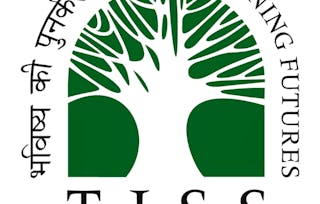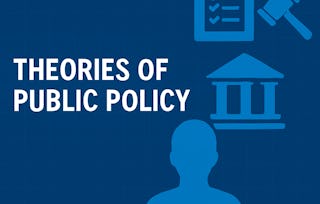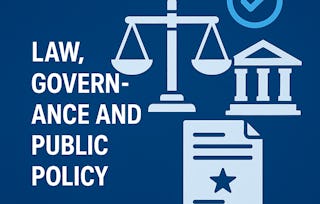Using Public Policy for Social Change provides a comprehensive introduction to public policy and its role in addressing societal challenges, with a focus on social inequalities. You’ll explore various areas of policy work, including social welfare, public health, the environment, education, and criminal justice. Learn the fundamentals of public policy design and analysis, and how policymaking functions across all levels of government in democracies worldwide.

Using Public Policy for Social Change

(177 reviews)
Recommended experience
What you'll learn
Learn to identify and define each step of the public policy-making cycle
How to analyze social issues from a policy perspective
Learn how advocacy work plays a part in policy-making
Skills you'll gain
Details to know

Add to your LinkedIn profile
13 assignments
See how employees at top companies are mastering in-demand skills

There are 4 modules in this course
Welcome to the Using Public Policy for Social Change course and the first-week module! This module provides an overview of the course and introduces learners to public policy as a field of professional practice. This includes an introduction to key concepts and terms and to a framework for understanding the policy-making process in democracies. Let's get started!
What's included
16 videos6 readings3 assignments2 discussion prompts
Welcome to Week 2! This module focuses on the first two steps in the policy-making cycle: “issue framing and “agenda setting.” This includes attention to how social problems can be researched, framed, and advocated for using an equity lens. This week will also include instruction in the basic elements of designing and implementing an advocacy strategy regarding a policy issue. Let's get started!
What's included
13 videos4 readings2 assignments1 app item2 discussion prompts
Welcome to Week 3! You passed the midpoint of this course. Great job! This module focuses on steps three and four in the policy-making process of policy design, which includes policy design and policy decision-making. We cover the basics of the policy design and the important role of prospective policy analysis in the process. The module will also present a framework for analyzing and justifying a specific policy idea/design that includes consideration of its impact, economic efficiency, ethical tensions, and equity/fairness implications. Let's get started!
What's included
11 videos3 readings5 assignments1 app item1 discussion prompt
Welcome to Week 4, the last week of this course! This module covers steps five and six in the policy-making cycle: policy implementation and policy evaluation. The focus of this module is on the major techniques used to assess whether public programs and policies are achieving their intended objectives and goals. The module includes a discussion of different types of program evaluation for assessing implementation and impact/outcome goals and the research approaches commonly used for public sector evaluation, including many examples. This module also provides some guidance regarding how to find resources related to policy evaluation research and other aspect of public policy. The module concludes with an overview of the course, along with some guidance for how to find your own niche in the world of using public policy for social change. Let's get started!
What's included
13 videos3 readings3 assignments2 discussion prompts
Instructor

Offered by
Explore more from Governance and Society
 Status: Preview
Status: PreviewTata Institute of Social Sciences
 Status: Preview
Status: PreviewO.P. Jindal Global University
 Status: Free Trial
Status: Free TrialO.P. Jindal Global University
 Status: Preview
Status: PreviewO.P. Jindal Global University
Why people choose Coursera for their career

Felipe M.

Jennifer J.

Larry W.

Chaitanya A.
Learner reviews
- 5 stars
87%
- 4 stars
12.99%
- 3 stars
0%
- 2 stars
0%
- 1 star
0%
Showing 3 of 177
Reviewed on Jan 23, 2024
A definitive course for a strong grip on basics for those who a strong passion for Policy
Reviewed on Jul 22, 2025
Very educational and a great course as an introduction to public policy! I learnt a lot and feel competent to be able to speak about public policy at a high level.
Reviewed on Nov 21, 2024
Fantastic foundation for pursuing a career in Public Policy. The instructor was top-notch!

Open new doors with Coursera Plus
Unlimited access to 10,000+ world-class courses, hands-on projects, and job-ready certificate programs - all included in your subscription
Advance your career with an online degree
Earn a degree from world-class universities - 100% online
Join over 3,400 global companies that choose Coursera for Business
Upskill your employees to excel in the digital economy
Frequently asked questions
To access the course materials, assignments and to earn a Certificate, you will need to purchase the Certificate experience when you enroll in a course. You can try a Free Trial instead, or apply for Financial Aid. The course may offer 'Full Course, No Certificate' instead. This option lets you see all course materials, submit required assessments, and get a final grade. This also means that you will not be able to purchase a Certificate experience.
When you purchase a Certificate you get access to all course materials, including graded assignments. Upon completing the course, your electronic Certificate will be added to your Accomplishments page - from there, you can print your Certificate or add it to your LinkedIn profile.
Yes. In select learning programs, you can apply for financial aid or a scholarship if you can’t afford the enrollment fee. If fin aid or scholarship is available for your learning program selection, you’ll find a link to apply on the description page.
More questions
Financial aid available,

